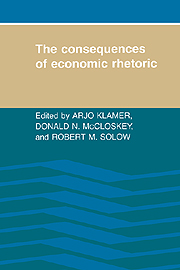Book contents
- Frontmatter
- Contents
- Preface
- The consequences of economic rhetoric
- PART I ECONOMIC RHETORIC: INTRODUCTION AND COMMENTS
- PART II ECONOMIC RHETORIC: FURTHER ARGUMENTS
- PART III ECONOMIC RHETORIC AMONG ECONOMISTS
- PART IV ECONOMIC RHETORIC IN POLITICS AND JOURNALISM
- 13 The heterogeneity of the economists' discourse: Philosopher, priest, and hired gun
- 14 The grammar of political economy
- 15 The rhetoric of economics as viewed by a student of politics
- 16 “Yellow rain” and “supply-side economics”: Some rhetoric that failed
- PART V ECONOMIC RHETORIC: ITS RHETORIC AND ITS CONSEQUENCES
- 1 Appendix: Other contributors and participants
- Index
16 - “Yellow rain” and “supply-side economics”: Some rhetoric that failed
Published online by Cambridge University Press: 07 September 2010
- Frontmatter
- Contents
- Preface
- The consequences of economic rhetoric
- PART I ECONOMIC RHETORIC: INTRODUCTION AND COMMENTS
- PART II ECONOMIC RHETORIC: FURTHER ARGUMENTS
- PART III ECONOMIC RHETORIC AMONG ECONOMISTS
- PART IV ECONOMIC RHETORIC IN POLITICS AND JOURNALISM
- 13 The heterogeneity of the economists' discourse: Philosopher, priest, and hired gun
- 14 The grammar of political economy
- 15 The rhetoric of economics as viewed by a student of politics
- 16 “Yellow rain” and “supply-side economics”: Some rhetoric that failed
- PART V ECONOMIC RHETORIC: ITS RHETORIC AND ITS CONSEQUENCES
- 1 Appendix: Other contributors and participants
- Index
Summary
Much of the difficulty of covering economics for newspapers stems from the fact that serious conversations about economics are carried on at so many different levels of sophistication. In this respect economic doctrines are rather like religious convictions: Everybody has them, but a lot of folks didn't get them from the priest. After all, economic decisions are the very fabric of everyday life, full of every conceivable “could” and “should”; cab drivers and business people and schoolteachers all have opinions about the way the world works. Then there is a very considerable demimonde, where writers such as myself flourish, seeking to translate, interpret, or persuade; vehicles here include trade books, magazines, newspapers, pamphlets, and, of course, broadcast. But economics also has a province of the most learned discourse among scholars of the subject, and this empyrean realm is populated by rival schools that compete for public attention and support; there is no overarching consensus among them. So how exactly is economics different from religion? or science? or law? or politics? Surely the greatest difficulty in “translating economic discourse” into the language of the daily newspapers is knowing what to make of economic discourse in the first place.
This is a hard enough question on which to form a judgment even without Donald McCloskey, but McCloskey's book, The Rhetoric of Economics has raised the question in the most radical fashion.
- Type
- Chapter
- Information
- The Consequences of Economic Rhetoric , pp. 247 - 262Publisher: Cambridge University PressPrint publication year: 1989
- 2
- Cited by

